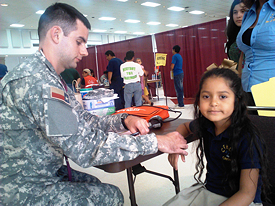Texas Department of Health Services and Texas Military Forces Jointly Train for Disaster Response
Spc. Luke Elliott, 100th Mobile Public Affairs Detachment
2011/08/04
 PFC Kyle O’Boyle of the Texas State Guard takes the pulse of Christa Benavides at Operation Lone Star 2011 in Laredo TX. Operation Lone Star is the nation’s largest humanitarian military exercise. It takes place each summer in the Rio Grande Valley and provides free medical care for two weeks for all who walk in. It’s also training for these soldiers and airmen for disaster response in Texas. It’s a joint project of the Texas Military Forces plus federal, state and local health agencies.Photo by COL Robert Morecook, JTF-OLS PAO, TXSG
PFC Kyle O’Boyle of the Texas State Guard takes the pulse of Christa Benavides at Operation Lone Star 2011 in Laredo TX. Operation Lone Star is the nation’s largest humanitarian military exercise. It takes place each summer in the Rio Grande Valley and provides free medical care for two weeks for all who walk in. It’s also training for these soldiers and airmen for disaster response in Texas. It’s a joint project of the Texas Military Forces plus federal, state and local health agencies.Photo by COL Robert Morecook, JTF-OLS PAO, TXSG
LAREDO, Texas—Some describe it as a disaster response exercise, while others call it the nation’s largest humanitarian medical mission. The reality is that Operation Lone Star is both.
On Aug. 1, Operation Lone Star, a 13-year, annual tradition in Southern Texas, began its second week of providing health care services to people living near Laredo, Hebbronville, and Rio Bravo, Texas.
The Texas Department of State Health Services supported by the Texas State Guard, Texas Army and Air National Guard, U.S. Public Health Service, and country and local municipalities are collaborating for the exercise. Operation Lone Star is a real-world, emergency response exercise that allows first-response agencies and organizations to prepare for potential disasters while at the same time providing free medical care to those in need along the Texas border.
More than 400 military members, 300 federal, state and county employees and a myriad of volunteers united for the exercise, which started July 25 and ends Aug. 5. It provides a variety of medical services to include immunizations, sports physicals, blood pressure screenings, vision exams, pharmaceutical service, medical referrals, ministry services and preventative health education.
Operation Lone Star workers and volunteers provided more than 36,000 health services to about 5,950 people during the first week of the exercise, which was held in several Texas cities to include Brownsville, San Juan, Mission and Rio Grande City.
“We are providing free healthcare to the surrounding communities, those that are in underprivileged areas and those that do not have access on a day-to-day basis to affordable healthcare,” said Capt. Daniel Sem, a second-year, Operation Lone Star veteran. He is serving as the Texas Army National Guard officer in charge at the Laredo Operation Lone Star site. “I came away last year, and I trust I will come away this year, feeling like we did a job well done out here. We got a mission and a purpose and made an impact on the community.”
One of Capt. Sem’s Soldiers, Spc. LaRee Lennox, 162nd Area Support Medical Company, a Texas Army National Guard unit from San Antonio, Texas, said that since a lot of people here could not afford healthcare or insurance, this event helped provide much needed annual checkups and immunizations.
“I think it’s awesome that we’re helping,” said Lennox. “Everybody should have a chance to be healthy and get checked out, so I think it’s a good thing.”
While providing medical care is a major focus of the event, the other purpose is to prepare disaster response agencies and organizations in case an emergency situation, such as a hurricane landfall, emerges.
“The training that we get in running a non-disaster exercise like this prepares us for working together in disaster situations,” said Col. Robert Morecook, public affairs officer for the Medical Brigade of the Texas State Guard. “We get to know each other’s capabilities. We get to know each other’s personalities. We get to see where the strengths and the weaknesses are in our organization in a situation before a real disaster happens.”
This real-world training exercise is an important part of emergency preparedness for the Texas Military Forces and other agencies that may respond to hurricanes and other disasters.
“The training value from this is invaluable because when we have an emergency situation, a hurricane, a fire, a flood, whatever could happen, it’s better to learn it here in a controlled environment, a nonemergency environment, where we can come together and work out all the different hiccups and kinks in the system,” said Capt. Sem.
Operation Lone Star health care services will be available through Aug. 5 at the Laredo Civic Center at 2400 San Bernardo Ave. and at Hebbronville High School at 210 Longhorn Lane in Hebbronville, Texas. Services will also be provided Aug. 3-4 at the Rio Bravo City Hall at 1701 Centeno Ln. in Rio Bravo, Texas.